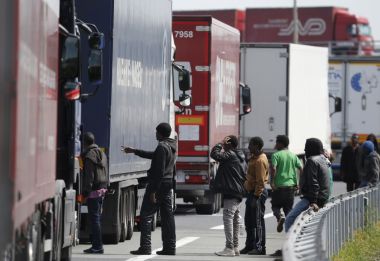Calais Migrants pose moral questions we should not ignore

Would-be immigrants to Britain have been in the news because they have taken advantage of a strike by French ferry workers to try to board queuing lorries at Calais. Around 3,000 of them are living rough in the area in hopes of making it across the Channel to the UK. It's been chaos, and the situation is expected to get worse during the summer as the situation with the continued influx of migrants from across the Mediterranean.
I know all about this. They want to come over here because they can get ridiculously generous benefits and free council houses, while the French just leave them to starve in the gutter.
Exactly none of these things are true.
Seriously?
Yes. Britain's policy towards migrants and asylum seekers is actually pretty draconian: according to the Refugee Council, asylum seekers are not allowed to work and state support can be as little as £5 a day, they cannot jump the queue for council housing and can't choose where they live. Many families are unable to pay for basics like clothing and nappies. Many women have experienced sexual violence since coming to the UK. On the other hand, France's asylum system is overloaded, underfunded and creaking.
Anything else?
It's very hard to get asylum in Britain, though not as hard as it is in France. A 2011 study found that the courts overturned more than a quarter (26 per cent) of Home Office rejections; this nearly doubled, to 50 per cent, in the case of women. When people are recognised as refugees they are given permission to stay for only five years and can have their cases reviewed at any time. That makes it very hard to plan a future.
It doesn't sound quite so attractive now. Why do they want to come?
Listen to interviews with them and many will say that "Britain is better than France." Bien sur, but they also believe that it's easier to find work in Britain in the "black economy" – a charge repeated by French politicians – and many of them speak English rather than French.
Are you saying they want to work?
Yes. The idea that they want to live the rest of their lives as freeloaders is a myth, according to the Red Cross. Britain is seen as the land of opportunity for people fleeing really terrible conditions at home.
But surely the present situation is hardly satisfactory.
Possibly the understatement of the year. The migrants are living in unhygenic, primitive conditions, with no sanitation or running water, fed by charities. They shelter in tents or under tarpaulins. Feeling against them in Calais is running high. They take any opportunity they can to stow away on lorries crossing on ferries or through the Channel Tunnel, in spite of the high security. Lorry drivers who fail to spot them are heavily fined, though they rightly say they're drivers, not security guards.
It seems incredible – you know, in this day and age ...?
Quite, and it is stoking up an almighty row between Britain and France. France is planning to build a temporary shanty town for the migrants, which Britain believes will just act as a magnet for more of them (it's planning another on the Italian border, where there are similar problems). France says that Britain hasn't contributed enough money to help Calais deal with the problem.
What about the legalities of it all?
According to the Dublin II agreement, asylum seekers are supposed to be processed in the first country they arrive in and can't choose where they apply. If there's no record of where they came from it's very difficult for the French to deport them, because no one else is under any obligation to take them.
So why won't Britain let them in?
An excellent question, with no satisfactory answer. Britain says that it is worried about Islamist terrorists infiltrating the country via Calais. Frankly, there must be easier ways to get into the country, if you are a terrorist. The present government is also determined to crack down on immigration in any case. It sees this as a French problem.
This doesn't seem to reflect very well on Britain, candidly.
Arguably it does not, and it is linked to the wider question of what to do with refugees. The Calais problem has been around for years, but it has been sharpened recently because of the massive increase in refugees across the Mediterranean; it is only going to get worse. Britain – like some other countries – has rejected a "quota" system whereby refugees are shared out between different countries. In the first quarter of 2015 it received only a tenth of the number of asylum applications Germany did, at 7,330; France and Italy had double that.
Isn't there a case for just letting them come in?
Yes. This is a very uncomfortable position to be in, and many would argue that Britain should be doing much more to help resettle refugees. However, while letting 3,000 people in – a relatively small number, not all of whom would stay anyway – it wouldn't be long before the pressure built up again. While this would be a simple and effective humanitarian gesture, the real solutions lie much further upstream, in the conditions which have driven desperate people to make this journey in the first place.
You make it sound like a moral question rather than just a practical one.
It is a moral question, and the sad thing about the events of the last few days in Calais is that those involved have come to be seen as problems rather than people. Migrants, refugees and asylum-seekers – the distinctions blur – are not a popular cause in the UK today. However, that shouldn't affect how Christians think and act.
Follow @RevMarkWoods on Twitter.











